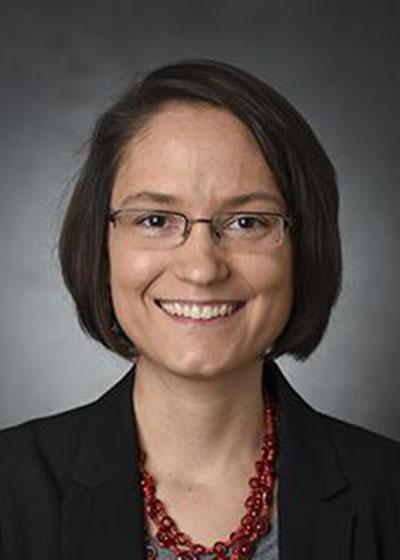Allison Beese received her B.S. in Mechanical Engineering from Penn State University. She then worked as an engineer at Knolls Atomic Power Laboratory before entering graduate school. She earned her M.S. and Ph.D. in Mechanical Engineering from the Massachusetts Institute of Technology (MIT). As a graduate student, she worked in the Impact and Crashworthiness Lab, where she focused on experimentally measuring and computationally modeling the multiaxial deformation and fracture of advanced high strength steels. After graduation, she became a postdoctoral fellow at Northwestern University in the Nano and Micromechanics Lab, where she performed experiments on materials ranging from carbon-based fibers and sheets to biological cells using a range of techniques including microelectromechanical systems (MEMS)-based testing techniques in situ a transmission electron microscope (TEM). She joined Penn State’s Department of Materials Science and Engineering in 2013, and also holds a courtesy appointment in the Department of Mechanical Engineering.
This faculty member is associated with the Penn State Intercollege Graduate Degree Program (IGDP) in Materials Science and Engineering (MatSE) where a multitude of perspectives and cross-disciplinary collaboration within research is highly valued. Graduate students in the IGDP in MatSE may work with faculty members from across Penn State.
Professor Beese’s research interests are in experimental and computational multiscale mechanics of materials, with an emphasis on metallic materials. Her research focuses on developing experimental methods to elucidate the connections among the microstructure, macroscopic deformation, damage accumulation, and failure properties of materials. Her group uses experimental data to develop and validate physically-based plasticity and fracture models that can be used to predict and prevent component performance.
One research thrust in her group focuses on additive manufacturing (AM) of metallic components. In AM of metals, powder or wire feedstock is delivered to a location, melted with a laser or electron beam, and as the material cools and solidifies, it fuses to the material below. This allows for the fabrication of complex 3-dimensional components in a layer-by-layer fashion. However, it introduces rapid thermal cycles that result in microstructures that differ drastically from those seen in cast or wrought counterparts. To reliably use these components in structural applications, their mechanical properties must be understood and predictable. Professor Beese’s group focuses on a variety of materials characterization techniques to uncover the relationships among thermal history, microstructure, and mechanical properties within monolithic and gradient components made by AM.
Another research thrust focuses on uncovering the mechanisms of ductile failure of metals over a wide range of stress states toward the development of predictive computational fracture models. Two applications in which these models are critical are in forming operations and crash situations of automobile components. Advanced High Strength Steels are a particularly attractive class of materials for the automobile industry, as they offer increased strength over traditional steels without sacrificing ductility, lending themselves to application in lightweight vehicle structures. However, to fully exploit their benefits, it is imperative to understand the mechanisms of deformation and failure in order to develop appropriate computational models. Professor Beese’s group develops experimental techniques to characterize the evolving microstructure of these steels, some of which undergo a phase transformation upon deformation, and their corresponding behavior, which they in turn use to develop computational material models.
- TMS AIME Robert Lansing Hardy Award (2018)
- NSF CAREER Award (2017)
- International Outstanding Young Researcher in Freeform and Additive Manufacturing Award (2017)
- 3M Non-Tenured Faculty Award (2016)
- Oak Ridge Associated Universities (ORAU) Ralph E. Powe Junior Faculty Award (2015)
- TMS Young Leader Professional Development Award (2015)


